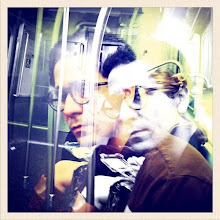In 1848, Elder Joseph Brackett of the Shaker community in Alfred, Maine, wrote "Simple Gifts." The lyrics:
'Tis the gift to be simple, 'tis the gift to be free,
'Tis the gift to come down where we ought to be,
And when we find ourselves in the place just right,
'Twill be in the valley of love and delight.
When true simplicity is gain'd,
To bow and to bend we shan't be asham'd,
To turn, turn will be our delight,
Till by turning, turning we come out right.
This is a Shaker work song and, though not demonstrative of the more amorphous, spontaneous strain of Shaker music, seems meaningful to pause over as monodic argument for the asemic strain. The liberating gift of descent lands the singer in a valley of love and delight, wherein of bow and bend there shall be no shame.
The bow is both an embodied descent and a bent strip of wood, strung taut to launch arrows. The bend is a tripartite bend of this bow, its bend of the body, and the bend of the musical measure of the song, sensible in the stretch from the iambic phrase, 'to bow,' to the anapestic phrase, 'and to bend.' The confluent 'bends' here echo the structure of Paz's 1956 El arco y la lira, tr. The Bow and the Lyre (ie. political instrument and musical instrument), which articulates a theory of poetry as distinct from poem, and of poem as discrete but not excluded from poetry as political organization.
There can be no society without poetry, but society can never be realized as poetry, it is never poetic. Sometimes the two terms seek to break apart. They cannot.
The poetic society then, in its realization, according to Elder Joseph's song, is a thing of which we will feel no shame. Having been liberated, to continuously turn in that liberty will be our delight--and by such delightful, reorienting volutions, we will come out right--come out in accordance with what is good.
In the more asemic strains of their music, the Shakers did not articulate their reorienting volutions but rather demonstrated them. Many lyrics of these songs consist of words from unknown tongues, imitated from the sounds of Native-American languages and the songs of African slaves, whom the Shakers would purchase to liberate, thus precluding further enslavement. The poetics of such a society become an abstract splendor; this is to say that the music was as consequent of political frame as political frame was of musicality embodied and emboldened.
In such bold presentation, Sun Ra descends to planet Earth. Sun Ra traveled from Saturn, where he was designated as the eye of God, to observe humanity and show them that they had entered a new age (of 'colorful presentation' and 'abstract images'). Saddened that Earth's sound was 'one of guns and thunder,' Ra was torn between the transmission of this observation back to God and the desire to reflect for humans the splendors of the age in which they were living. This was his simple gift.
In addition to the bibliography I detailed in the post previous to this, Sun Ra's syllabus included a reference list of his own, most essential albums. I have linked the albums on that list here:
My Brother the Wind, Vol. I
My Brother the Wind, Vol. II
The Night of the Purple Moon
Atlantis
Strange Strings
Heliocentric Worlds, Vol. I
Heliocentric Worlds, Vol. II
Heliocentric Worlds, Vol. III
The Magic City
The Nubians of Plutonia
Fate in a Pleasant Mood
Monorails and Satellites
And, simply because it is beautiful, I am including Spaceways, 1968, as well:
Part I
Part II
Thursday, March 26, 2009
Subscribe to:
Post Comments (Atom)




4 comments:
A song of image and sound on Sun Ra's descent to this world. "Calling Planet Earth" http://www.youtube.com/watch?v=8Un6pmJK_ZE&feature=player_embedded
aye. and arrival to earth
http://www.youtube.com/watch?v=bfLpnXQpjvw
the track "The Wind Speaks" sounds like signing on to the internet with dial-up and then going to the dentist and then milk foaming. crazy!
thank you for your work. beautiful, much appreciated
Post a Comment